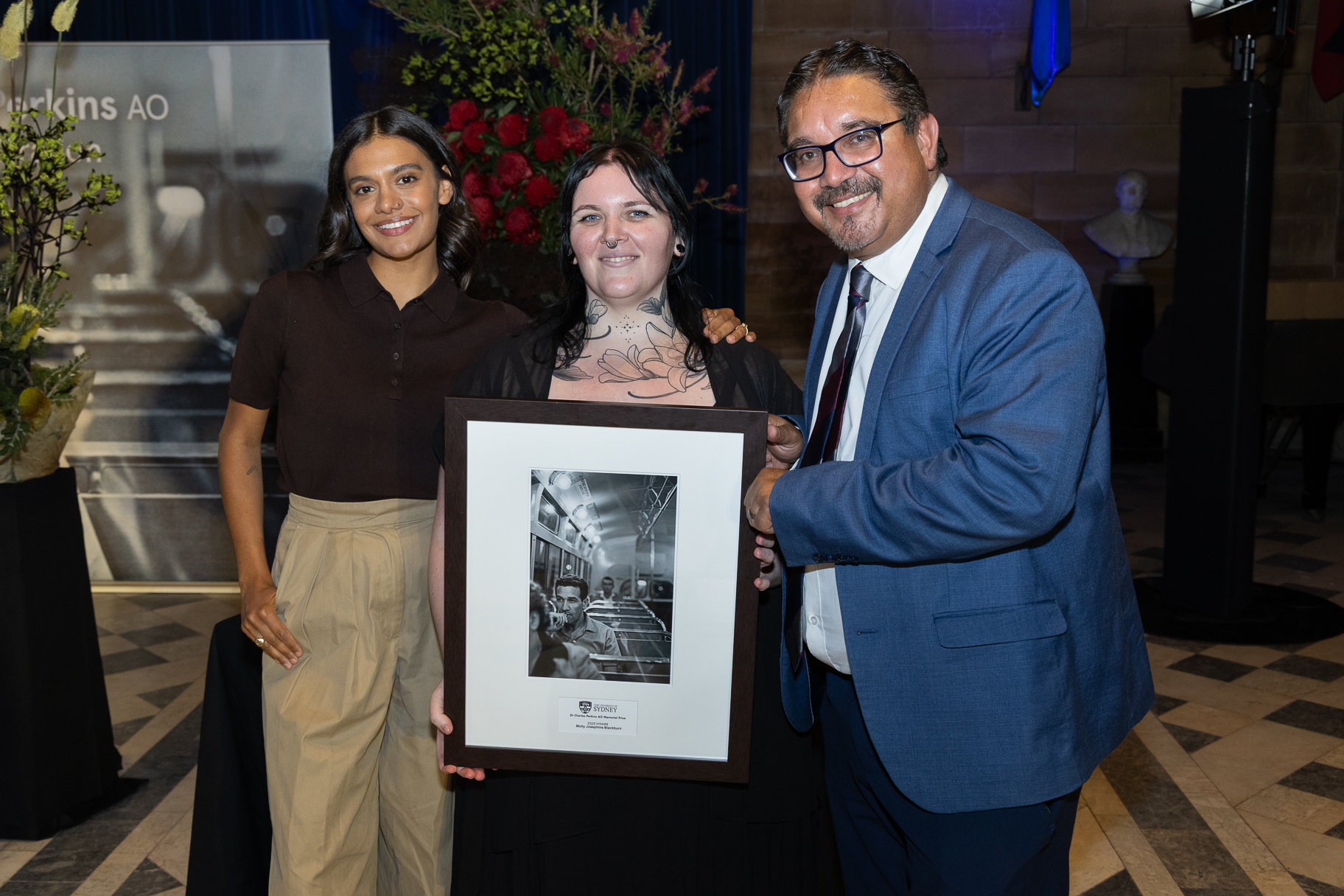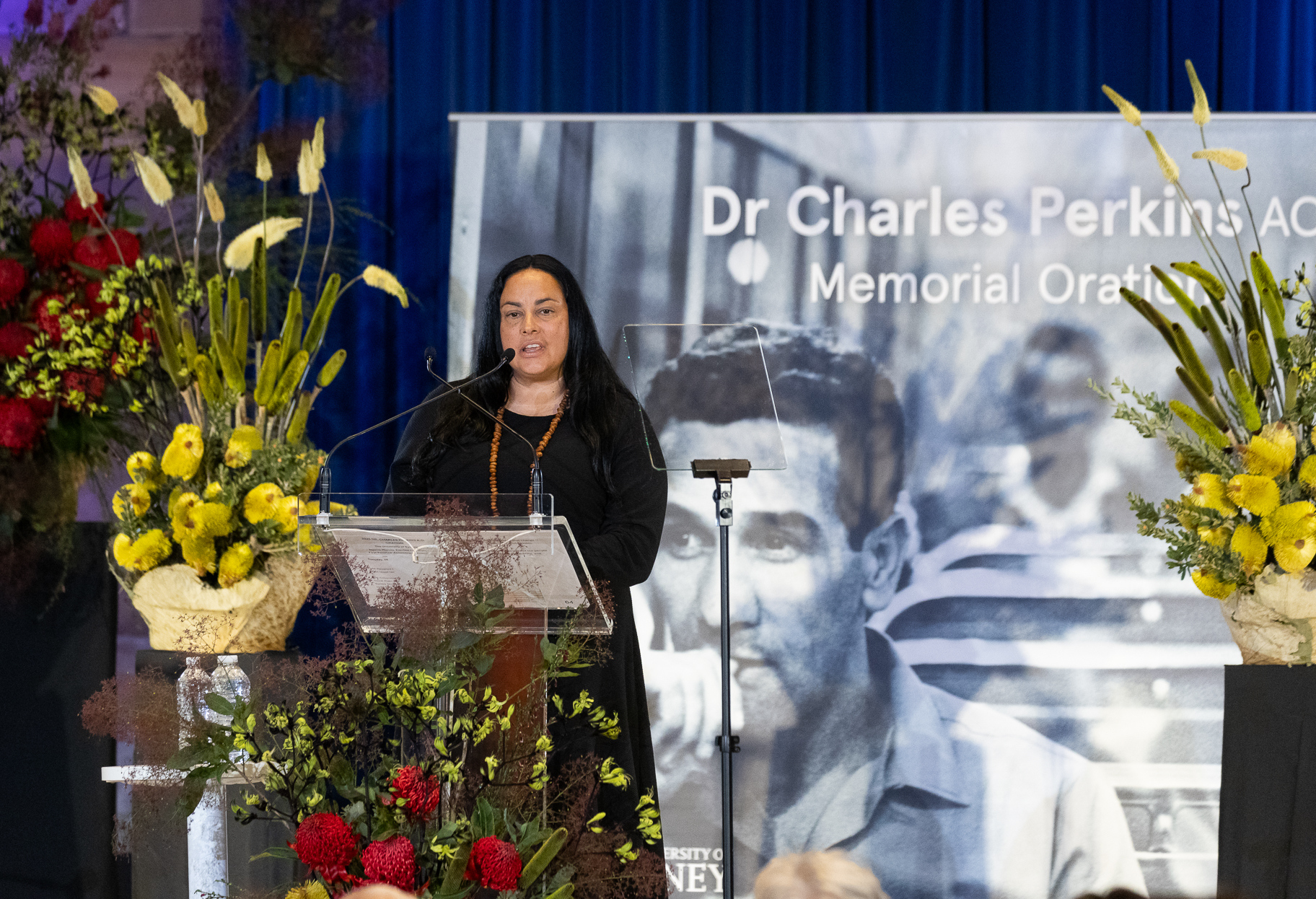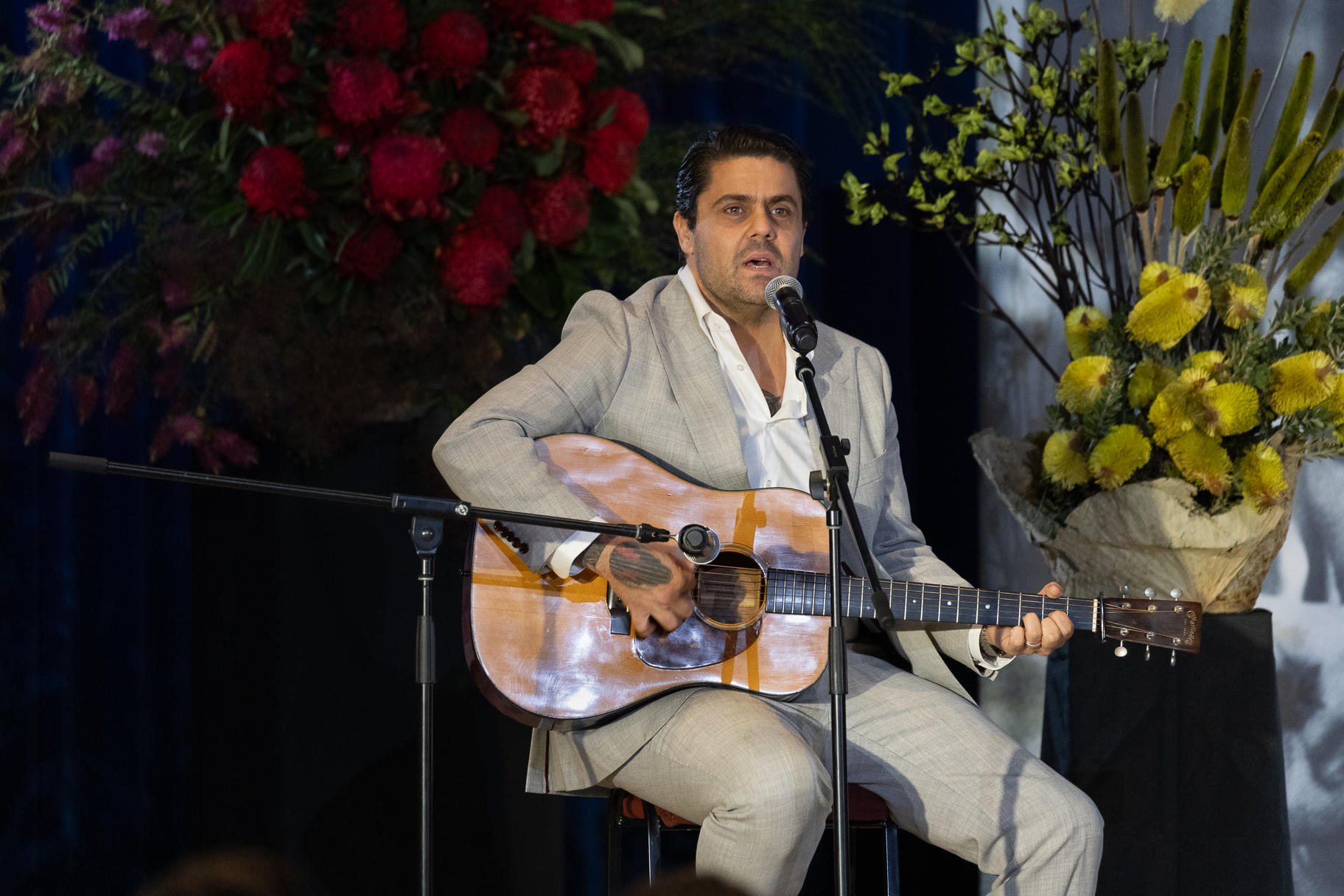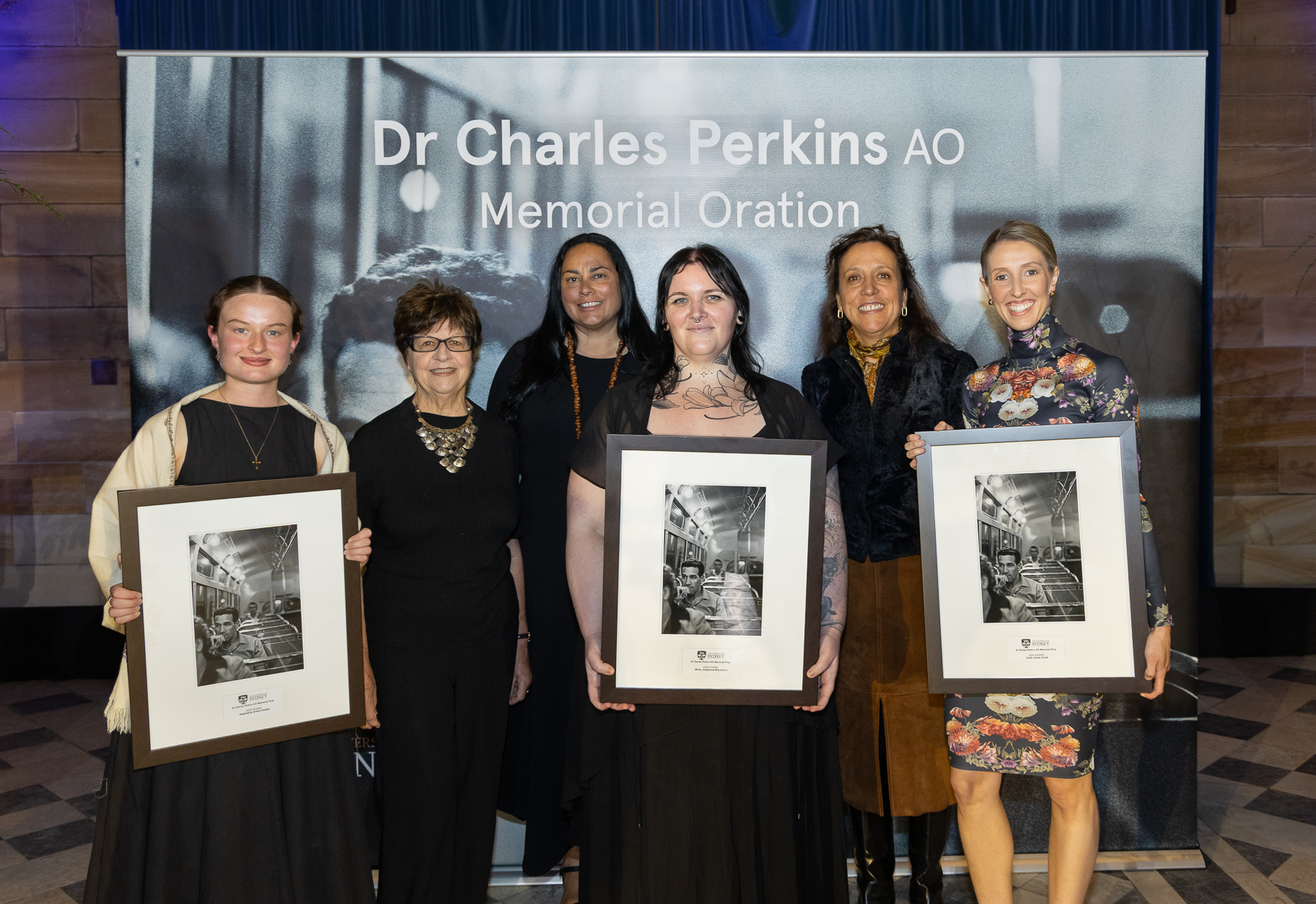After years of negotiation, the Victorian Government is set to become the first Australian state to legislate a formal treaty with Aboriginal people. Ngarra Murray, elected co-chair of the First Peoples' Assembly of Victoria - the body leading the path to Treaty in Victoria -delivered the 25th Dr Charles Perkins Oration on Tuesday 28 November at the University of Sydney, sharing the journey to Treaty so far.
In 1965, a group of University of Sydney students led by Charles Perkins embarked on a historic journey to challenge racial discrimination in Australia. Known as the Freedom Rides, this civil rights campaign challenged societal norms and paved the way to the 1967 referendum, which amended Australia's constitution to include First Nations people as equal Australian citizens.
Sixty years on from that pivotal moment, we are once again on the cusp of the next chapter in Australia's story, as Ngarra Murray highlighted at the Oration.
A Wamba Wamba, Yorta Yorta, Dhudhuroa and Dja Dja Wurrung woman, Ms Murray paid tribute to Dr Perkins in her address, sharing a memory of him coming to the Moama Local Aboriginal Land Council. Her inclusion in meetings like the one Dr Perkins joined shaped her leadership journey: "We grew up listening to the language of change, strategy and struggle, learning early what it means to carry responsibility," she said.
Throughout her address, Ms Murray continued to recognise the immense work of the Elders who had come before her, leading fights for rights and justice, and the foundation for Treaty.
Treaty to bring Australia together
"We have survived policies designed to erase us, institutions built to exclude us, and a nation that for too long looked away from our truth.
rn
"But now, something extraordinary is happening. We are standing on the threshold of a new era - the Treaty era."
rn
She explained that a healthy, cohesive society is one that acknowledges its faults and actively works to fix them, and that the best people to recognise these issues are those most affected by them.
rn
"Treaty is based on a simple principle - that Aboriginal people are the experts when it comes to our Countries, cultures and communities," Ms Murray said.
rn
"Policies and programs work best when the people affected by them have a say in how they are delivered - that's why this Bill proposes to put decision-making powers into the hands of the First Peoples' Assembly."
rn"}}">
Ms Murray began by clarifying the meaning of Treaty, emphasising that it is about forging new, respectful relationships between Australia's First Peoples' and the state, with the shared goal of creating a better future.
"Treaty creates a new middle space where the unfinished business the Crown and First Peoples relations can be addressed, and where communities can shape agreements that honour First Peoples' culture, inherent rights and shared futures," she said.
"We have survived policies designed to erase us, institutions built to exclude us, and a nation that for too long looked away from our truth.
"But now, something extraordinary is happening. We are standing on the threshold of a new era - the Treaty era."
She explained that a healthy, cohesive society is one that acknowledges its faults and actively works to fix them, and that the best people to recognise these issues are those most affected by them.
"Treaty is based on a simple principle - that Aboriginal people are the experts when it comes to our Countries, cultures and communities," Ms Murray said.
"Policies and programs work best when the people affected by them have a say in how they are delivered - that's why this Bill proposes to put decision-making powers into the hands of the First Peoples' Assembly."
"Treaty is based on a simple principle - that Aboriginal people are the experts when it comes to our Countries, cultures and communities"
Ngarra Murray, co-chair of the First Peoples' Assembly of Victoria
The path to Treaty and the future
She reminded the audience that Treaty is not a new concept globally, citing examples from other First Peoples.
rn
"In 1788, the year the white man arrived right here on the shores of Sydney. But not many know that 10 years before that, in 1778, the Delaware Treaty with First Peoples was signed in the United States," said Ms Murray.
rn
"10 years before Victoria was settled, in 1840, one of our closest neighbours in Aotearoa signed the Treaty of Waitangi. As recently as 2023, the Whitecap Dakota signed a Treaty in Canada. They're not new, and there are hundreds like them.
rn
"Australia doesn't lack a treaty by accident, or because Australia predates the concept, and it certainly wasn't because of a lack of willingness from First Peoples."
rn
It was by decision by the people who came here who chose not to do Treaty, and our people paid the price. Treaty is about correcting that injustice. Pulling ourselves up as nation to be in line with the international standard and following best practice."
rn
Looking ahead, Ms Murray is optimistic about what comes next:
rn
"This Treaty heralds an era where everyone prospers... It is a future where our Country is known not just for its natural beauty, but for the way it nurtures culture, celebrates diversity, and ensures that safety, dignity and opportunity is shared by all."
rn"}}">
In acknowledging that the Treaty currently before the Upper House of the Victorian Parliament is the first of its kind in Australia, Ms Murray reflected on the long journey that led to this moment. She spoke of the resilience of those who have fought for justice and rights throughout Australia's history, citing Dr Perkins' Freedom Rides as one such instance.
She reminded the audience that Treaty is not a new concept globally, citing examples from other First Peoples.
"In 1788, the year the white man arrived right here on the shores of Sydney. But not many know that 10 years before that, in 1778, the Delaware Treaty with First Peoples was signed in the United States," said Ms Murray.
"10 years before Victoria was settled, in 1840, one of our closest neighbours in Aotearoa signed the Treaty of Waitangi. As recently as 2023, the Whitecap Dakota signed a Treaty in Canada. They're not new, and there are hundreds like them.
"Australia doesn't lack a treaty by accident, or because Australia predates the concept, and it certainly wasn't because of a lack of willingness from First Peoples."
It was by decision by the people who came here who chose not to do Treaty, and our people paid the price. Treaty is about correcting that injustice. Pulling ourselves up as nation to be in line with the international standard and following best practice."
Looking ahead, Ms Murray is optimistic about what comes next:
"This Treaty heralds an era where everyone prospers... It is a future where our Country is known not just for its natural beauty, but for the way it nurtures culture, celebrates diversity, and ensures that safety, dignity and opportunity is shared by all."
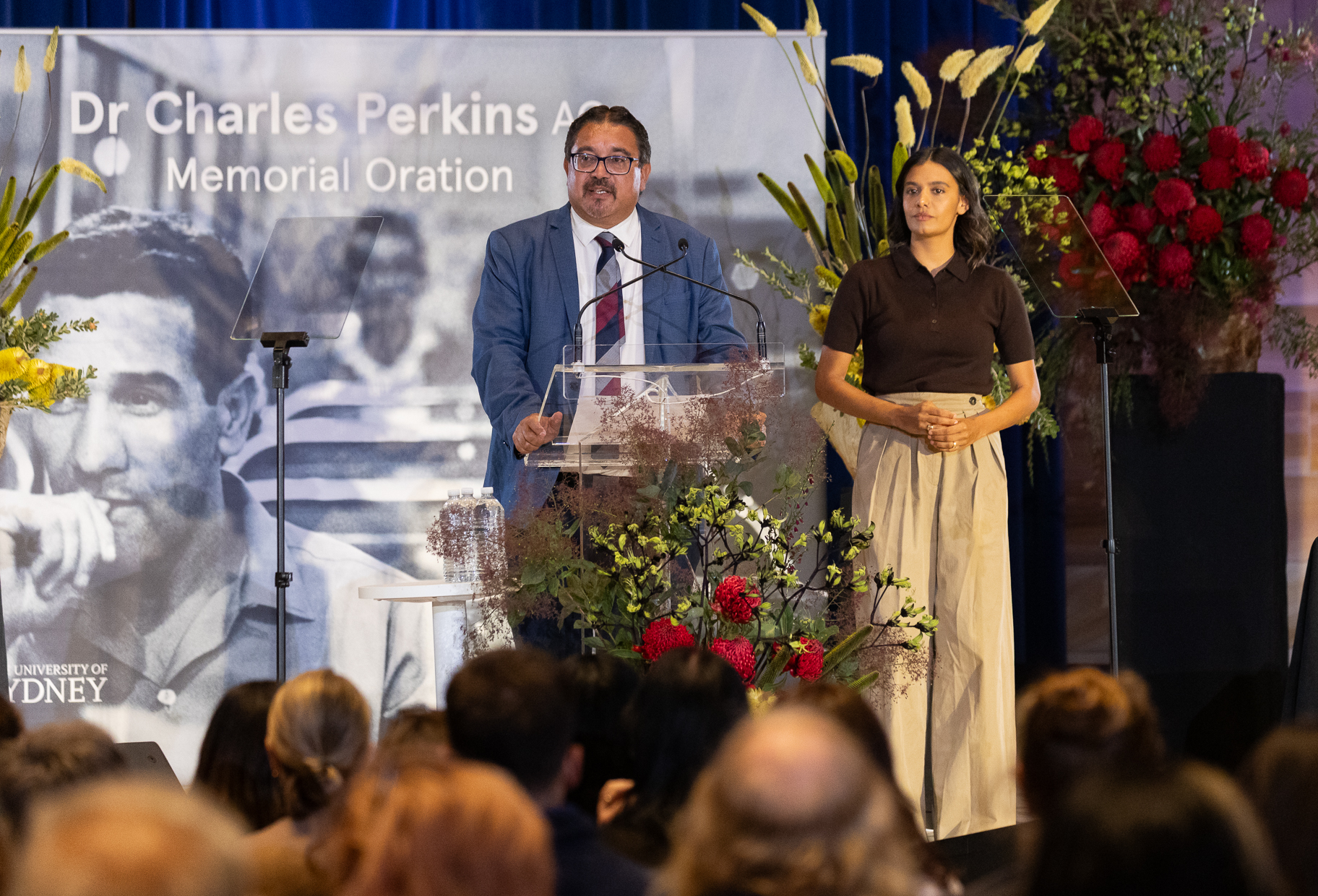
Deputy Vice-Chancellor (Indigenous Strategy and Services), Professor Reuben Bolt and Dr Perkins' granddaughter Madeleine Madden. Photo credit: The University of Sydney/Bill Green.
The Dr Charles Perkins Memorial Prize
The Oration event also celebrates the recipients of the Dr Charles Perkins Memorial Prize, awarded to the University's highest-performing Aboriginal and Torres Strait Islander students. Each recipient is awarded $4000 in recognition of their academic excellence. The 2025 recipients of the Charles Perkins Memorial Prize are:
- Molly Blackburn
- Holly Doyle
- Stephanie Howes
Upon receiving the award, Molly Blackburn reflected on her journey to and through university, expressing gratitude to Dr Perkins and the generations of First Nations people who paved the way for "us to succeed at institutions not made for us."
She shared that receiving the prize was a recognition of her determination and resilience, and that it has boosted her confidence in pursuing her goals.
Molly also shared advice for First Nations students considering coming to the University of Sydney:
"Get in contact with the Gadigal Centre as soon as possible," she said. "They want to help you succeed - if you've had to move away from Country to come to uni, it's easy to feel disconnected. You'll meet so many people at the Gadigal Centre who are in the same boat. Connect with them and you'll have a community here who understands you, with someone always free for a yarn if you need it."
The University of Sydney has partnered with NITV as host broadcaster of this special event. The Oration will be available to view on SBS OnDemand from November 17 2025.
The Charles Perkins Memorial Prize is made possible through the Charlie Perkins Scholarship Trust and the University's Indigenous Strategy and Services portfolio.

